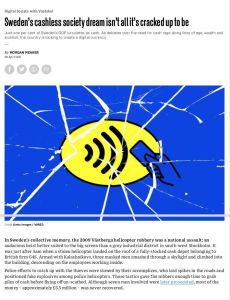
Recommendation
Sweden’s broad adoption of digital payments has its pluses and pitfalls, according to this insightful article by journalist Morgan Meaker. Though safer and often more cost effective, digital payments may not be ideal for all segments of society, Meaker finds, citing the challenges they present for low-income earners, the elderly and those in rural locales. Her reporting shows that policy makers need to consider the bigger picture when assessing the benefits and disadvantages of financial digitalization.
Summary
About the Author
Morgan Meaker writes for Digital Society, a publishing alliance with Vontobel.







Comment on this summary